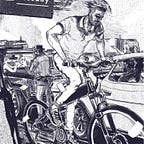Why I’m a Film Noir Junkie
The attraction. It’s magnetic. I didn’t know why. I resisted it because I just want to be happy. And to be surrounded by happiness. Or at least “try to be” happy as I analyzed in this article on Medium. But I can’t avoid it. I’m a Film Noir junkie. And I finally figured out why.
This will sound crazy. But I don’t care. Film Noir attracts the crazies because it’s our medium. It has taken years for me to figure it out, but I love Film Noir because I’m an Arab American.
I’m a student of Film Noir. I have attended Film Noir festivals in Hollywood for almost ten years. I have read many books and articles. I try to watch Eddie Mueller every Sunday morning on the Turner Classic Movie channel’s Noir Alley. And I even have a certificate in Film Noir from Ball State University after completing the first ever Tuner Classic Movie channel companion course a few years ago.
One thing I have learned about Film Noir is the genre is not static, but there is a generally-accepted time frame of the early 1940s to 1958. It “starts” with John Huston’s “The Maltese Falcon” and “ends” with “Touch of Evil” being recognized as the final true Film Noir. That’s the one where Charlton Heston plays a Mexican and Orson Welles plays an alcoholic, corrupt cop. (I have those words in quotes because the timeframe is generally accepted, not universally.)
So, why would an Arab American from north Orange County California be addicted to something relatively obscure as Film Noir? It’s because of the mutual feelings of alienation. One of the overarching themes of Film Noir is that most characters (bad guys/gals, good guys/gals, whatever that meant then or now) all felt “outside of society”. And, in my opinion, they mostly all wanted to be “in” society but couldn’t figure out how to do so, at least not “legally” or socially acceptably (sp.?).
As an Arab American growing up during the 1980s and 1990s, I understand what it feels like to be an outsider. I have detailed my feelings in numerous articles and in a screenplay (currently in development), when your parents are from a place that scares people by its name alone, it tends to mess with you. Yes, some of those feelings stem from psychological wounds, but those wounds resulted from growing up watching news stories, tv shows and movies constantly depicting people that looked like some of my relatives as “the enemy.” Of course, the tragedy of 9/11 didn’t help either.
The feelings and fear of doom are pervasive. Every Arab American (Christian, Muslim or atheist) says the same prayer when a bombing or other potential terrorist strike occurs throughout the world: Please dear God don’t let an Arab be involved! Do you see the “good” v. “evil” narrative? And, when you are branded as evil for no reason than sharing DNA with “evil” people, you can see where the alienation comes from.
But, this is an article about why an Arab American is a Film Noir junkie. So what is it about Film Noir? The films made in the 1940s and 50s referred to as “Film Noir” convey dark feelings of disillusionment, pessimism and cynicism. A recurring element is that the hand of fate can strike at any time, coupled with the fact that things are completely out of one’s control.
So, the doom. You know it’s coming, but from where? Much like being an Arab American, you know that a Film Noir is going to end on a “downer” (and that’s because the censors required that the bad guy never got away).
In Film Noir, the protagonist is more anti-hero than hero; a femme fatale is usually involved; crime is presented as a cunning exploit; and fatalism rules. The black/white of Film Noir reflects the black/white world portrayed in the films: there are always good guys and bad guys, i.e., good and evil, never mind the murkiness of morals and other tough life decisions.
If you have not seen “In a Lonely Place” starring Humphrey Bogart, then stop and watch it. As you sit there and watch “Dix Steele” constantly combust you will first ask, why? What is it with that guy? He can’t keep his emotions in check? And then you will get a sense of what it’s like to be an Arab American. It’s hard work keeping our emotions in check. But we do it. We have to. Because everyone else thinks we are so explosive and dangerous that we really don’t belong in society. You getting what I’m saying yet?
This article does an excellent job explaining Film Noir, the feelings of pessimism and “In a Lonely Place”. It helped me realize why I am a Film Noir junkie.
PS: The term “Film Noir” was coined by French film critics after World War II. After being under Nazi occupation for many years, and cutoff from American film for a number of years, French film critics coined the phrase “Film Noir” for a genre of films they received and reviewed after the war that involved private detectives, femme fatales, and generally bad people.
